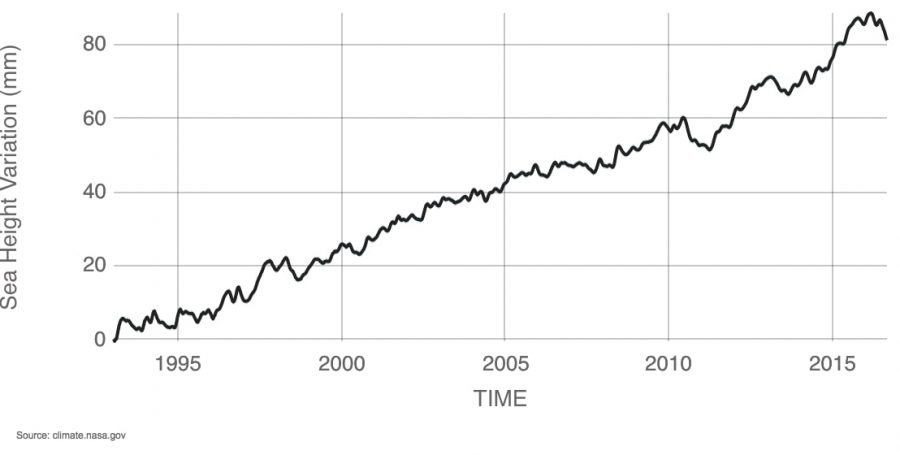Climate change is already a big problem
In the last few decades, sea level variation has increased by over 8 cm. or 3 in. primarily due to climate change.
November 16, 2021
According to the European Union’s Copernicus Atmosphere Monitoring Service, the ozone hole over the South Pole has grown to a size bigger than that of Antarctica. The ozone hole lets harmful ultraviolet radiation into the atmosphere that would have otherwise been blocked by the ozone layer.
Unfortunately, this is only one of the many problems that have arisen during this global climate crisis. Incidents such as this will only continue to worsen and multiply unless immediate action is taken to reduce greenhouse gas emissions.
According to a poll conducted by the Pew Research Center, 67% of Generation Z, people born from the late 1990s to the early 2010s, believe that climate change is a top priority. Although this statistic may seem like a good sign, there is still a substantial portion of our generation that does not take climate change seriously. Additionally, a smaller percentage of other generations are very concerned about the climate crisis. These generations are the ones that can actually do something more than just spreading awareness.
However, it seems like many of our government officials are not very concerned because they do not have to be. According to the Library of Congress, the average age of the members of the currently-serving 116th Congress, is around 60 years old for both Representatives and Senators.
Since these politicians will likely not be around for much longer, they do not have to face as many consequences for their inaction. Most likely, it will take several decades before the majority of these congressmen do have to face these consequences.
But knowing of the beast’s existence does not magically make it disappear. The truth is that conquering the challenges set by this crisis will involve altering our day-to-day lives and encouraging others to do the same. However, installing solar panels onto your house or only eating plant-based burgers can only do so much for the health of our planet.
It is important to mention that climate change is not purely the fault of developed countries such as our own.
In fact, most carbon emissions actually come from developing countries such as China and India. However, this does not mean to take the attitude of “not my problem”, because not only is it “your problem”, it is everyone’s problem.
Another important piece of the puzzle is to figure out how to convince major corporations, such as oil and gas companies, to take action as well, since they have a larger impact than the individual ever will. If even one of these giants can rise up to the stand and take more urgent action, they could lead other companies by example.
For instance, General Motors made an ambitious decision, promising to switch to all electric vehicles by 2035, which is definitely a step in the right direction.
Other car companies, such as Ford, are even starting to catch on with their own plans to switch to electric vehicles. However, a small fraction of car companies cannot be the only ones taking action.
For every corporation that actually tries to help combat climate change, there are certainly dozens of others that are not doing anything, or worse, potentially making the issue worse.
However, the actions that are being taken may be too little too late as climate change and its effects already play a role in our lives. At this point, it is not about whether or not climate change will impact the way we and other organisms live, it is about how severe the effects will be.
The fact is that climate change has already affected natural disasters. In the last five years, for instance, hurricane activity has increased. Two of the strongest hurricanes in Louisiana history, Laura and Ida, have occurred in the past two years, and that is probably not a coincidence.
Also, the sea level has risen over a half of a foot in the past 140 years or so. Even if all carbon emissions suddenly came to a halt, the effects of the emissions of the past will not go away for some time.
In fact, it is pretty much inevitable that global temperatures will rise by an average of 1.5 degrees Celsius, even in this best case scenario.
The bottom line is that the only way to truly solve the worldwide problem of climate change is to treat it like a worldwide problem, one that takes scientists, corporations, and ordinary people like us, whether in developed or developing countries, ideally in the form of new technology.
The human race has been capable of building technological marvels before, so it is not out of reach for us to build the necessary technology, such as renewable energy grids and carbon capture machines. Doing so will create a more habitable planet for all of us to call home for at least the foreseeable future and hopefully, countless generations to come
